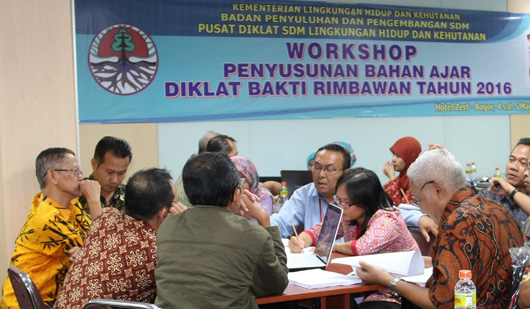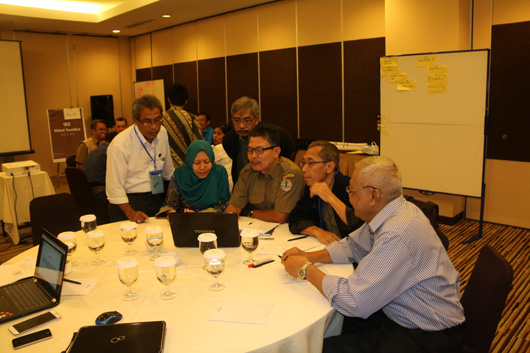FORCLIME
Forests and Climate Change ProgrammeTechnical Cooperation (TC Module)

Select your language
The Ambassador of the Federal Republic of Germany to Indonesia, Timor Leste and ASEAN, Dr. Georg Witschel, visited East Kalimantan Province on March 14 to 16, 2016. During the visit, his stopover was visiting the Training Centre of Environment and Forestry (BDLHK) Samarinda and the Forestry vocational school (SMKK) in Samarinda. A special welcoming dance, tari Enggang, performed by female students of the SMKK Samarinda greeted the Ambassador and his delegation.
During the welcoming speech, the Head of BDLHK Samarinda delivered an overview of training programs organized by BDLHK Samarinda and explained current cooperation with FORCLIME including the development of blended learning on conflict mapping and capacity development of lecturers (Widyaiswara) through training and study visit to Germany.
In his speech, the German Ambassador expressed his appreciation for the cooperation that has developed in the development of human resource capacity forestry and expected the initiatives that have been developed will be followed up with the aim to achieving the sustainable forestry development in Indonesia. During his visit to BDLHK, the Ambassador of Germany having dialogue with the Bakti Rimbawan, young foresters who are assigned to work with the Forest Management Unit. Additionally, the Ambassador also visiting classes and talking to students of the Forestry Vocational School of Samarinda.
For more information, please contact:
Edy Marbyanto, Strategic Area Manager for Human Capacity Development

In March 2016, the Center for Education and Training of Environment and Forestry (LHK Training Center) in Bogor conducted a two-day workshop on the preparation of standardized teaching materials for forest management targeted at young professional foresters. The workshop that was carried out in collaboration with GIZ FORCLIME aimed to set teaching material standards for the young professional forester programme of the Ministry of Environment and Forestry, named Bakti Rimbawan. The programme, which recruits fresh graduate foresters to be assigned at Forest Management Units (FMU) throughout Indonesia, aims to fulfil the needs of technical personnel in the FMUs. The young foresters may also be assigned at the local forestry services to assist with the implementation of forest management in the field.
During the workshop several resource persons, such as the Head of FMU Rinjani Barat and the technical directorates of the Ministry of Environment and Forestry relevant to the FMU development, provided their insights and inputs regarding the prepared teaching materials.
Up to early 2016, roughly 600 young foresters that graduated from university and the vocational forestry schools were recruited through the Bakti Rimbawan programme and are now assigned at the FMUs or at the local forestry institutions.
For more information please contact:
Edy Marbyanto, Strategic Area Manager, Human Capacity Development
Suherdi, staff of LHK Training Center, Ministry of Environment and Forestry

The Center for Education and Training of Environment and Forestry (LHK Training Center) in collaboration with GIZ FORCLIME organized a workshop on 4 – 5 March 2016 in Bogor to evaluate the application of blended learning . The purpose of the workshop was to evaluate the trial conduced on implemention of the blended learning method. In addition, a quality assurance standard for future e-learning design was to be developed. This event was attended by 30 participants from LHK Training Center and Training Agency of Environment and Forestry (BDLHK).
Through quality assurance standards for e-learning it can be ensured that the BDLHK and LHK Training Center can act as training providers for e-learning and are able to measure the accomplishments of e-learning implementation. Additionally, the standar enables continuous improvement. The quality assurance standard for e-learning includes criteria and indicators, as well as general e-learning standards. Criteria and indicators are based on the ECBCheck and the Caucasus e-Learning Quality Checklist and have been adapted to the LHK Training Center and BDLHK situation. The criteria and indicators for e-learning include: management and organization (roles and responsibilities, time management, resource management), content (modules, media and evaluation), programming and implementation of training. The discussion on e-learning standards covers: templates for training design/curriculum, communication in the training, training content, implementation and evaluation of training.
The LHK Training Center and BDLHK will conduct workshops in April and May as the follow up on strengthening the institutional for e-learning implementation.
For further information, please contact
Edy Marbyanto, Strategic Area Manager Human Capacity Development
Suherdi, Tim E-Learning Pusat Diklat LHK
 |
Supported By: |
  |